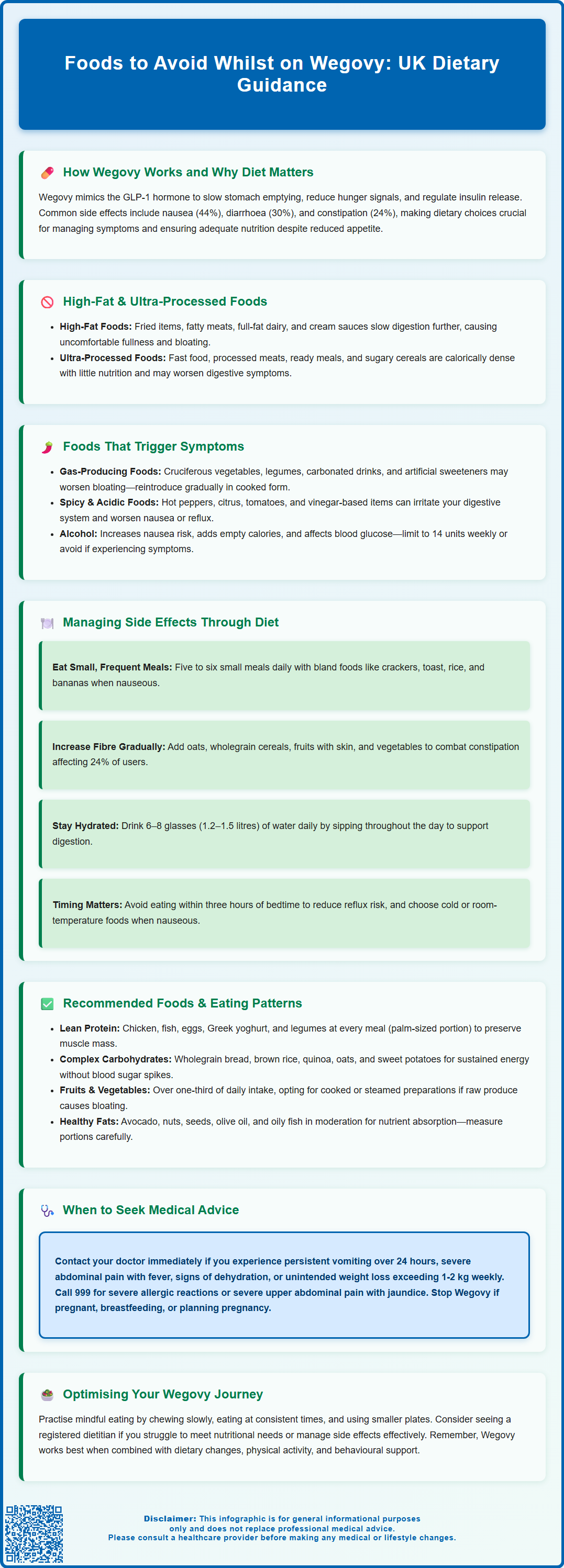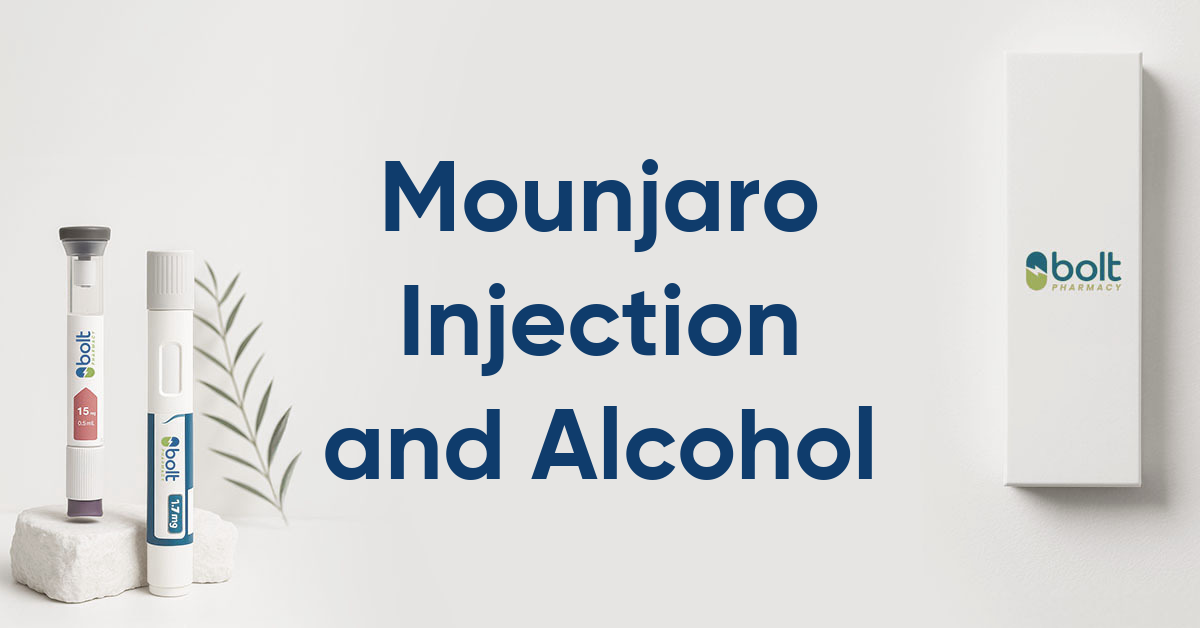Wegovy (semaglutide 2.4 mg) is a GLP-1 receptor agonist licensed in the UK for weight management in adults with obesity or overweight with weight-related comorbidities. Whilst there are no absolute dietary restrictions with Wegovy, certain foods can worsen common gastrointestinal side effects such as nausea, vomiting, and bloating. Understanding which foods to limit—and which to prioritise—can significantly improve treatment tolerability and support sustainable weight loss. This guide explains how Wegovy interacts with your diet, which foods may trigger symptoms, and practical strategies for optimising nutrition whilst taking this medication.
Summary: Whilst there are no absolute dietary restrictions with Wegovy, limiting high-fat foods, ultra-processed items, and foods causing bloating can reduce gastrointestinal side effects and support weight management.
- Wegovy (semaglutide) is a GLP-1 receptor agonist that slows gastric emptying and reduces appetite through central pathways in the brain.
- High-fat foods, fried items, and fatty meats can worsen nausea and bloating by further delaying digestion when combined with Wegovy's mechanism.
- Common gastrointestinal side effects include nausea (44%), vomiting (24%), diarrhoea (30%), and constipation (24%), typically during dose escalation.
- Focus on lean proteins, complex carbohydrates, and nutrient-dense foods whilst eating smaller, more frequent meals to improve tolerability.
- Seek medical advice for persistent vomiting lasting over 24 hours, severe abdominal pain, signs of dehydration, or inability to maintain adequate nutrition.
Table of Contents
How Wegovy Works and Why Diet Matters
Wegovy (semaglutide 2.4 mg) is a glucagon-like peptide-1 (GLP-1) receptor agonist licensed in the UK for weight management in adults with obesity or overweight with weight-related comorbidities. The medication works by mimicking the natural hormone GLP-1, which regulates appetite and food intake through several mechanisms. Semaglutide slows gastric emptying, meaning food remains in the stomach longer, creating a prolonged sensation of fullness. It also acts on appetite centres in the brain to reduce hunger signals and food cravings, whilst enhancing glucose-dependent insulin secretion in response to meals and suppressing post-prandial glucagon release.
Because Wegovy slows stomach emptying and reduces appetite via central pathways, dietary choices become particularly important during treatment. The slowed gastric emptying can make certain foods more difficult to tolerate, potentially exacerbating common gastrointestinal side effects such as nausea, vomiting, diarrhoea, and constipation. According to the SmPC, these adverse effects occur in approximately 44% (nausea), 24% (vomiting), 30% (diarrhoea), and 24% (constipation) of patients, typically during dose escalation phases.
Understanding the interaction between Wegovy and your diet is essential for several reasons:
-
Optimising treatment efficacy – appropriate food choices support the medication's weight loss mechanism
-
Minimising side effects – certain foods can worsen gastrointestinal symptoms
-
Maintaining nutritional adequacy – reduced appetite requires mindful eating to meet nutritional needs
-
Supporting sustainable weight management – developing healthy eating patterns alongside medication use

Foods to Avoid While Taking Wegovy
Whilst there are no absolute dietary restrictions with Wegovy, certain foods are more likely to trigger or worsen gastrointestinal side effects due to the medication's effect on gastric emptying. High-fat foods are particularly problematic as they naturally slow digestion further. When combined with Wegovy's mechanism, fatty meals can lead to prolonged feelings of uncomfortable fullness, nausea, and bloating. Foods to limit include fried items, fatty cuts of meat, full-fat dairy products, pastries, and cream-based sauces.
Highly processed and ultra-processed foods should be minimised for multiple reasons. These items often combine high fat, sugar, and salt content, making them calorically dense whilst providing minimal nutritional value. Examples include fast food, processed meats (sausages, bacon, deli meats), ready meals, sugary breakfast cereals, and packaged snacks. Such foods may worsen gastrointestinal symptoms and could counteract Wegovy's weight management benefits.
Foods that commonly cause bloating and gas may become more troublesome on Wegovy. Whilst many of these foods are nutritious, they may need temporary reduction if symptoms are problematic:
-
Cruciferous vegetables (broccoli, cauliflower, Brussels sprouts, cabbage)
-
Legumes and pulses (beans, lentils, chickpeas)
-
Carbonated beverages
-
Artificial sweeteners (sorbitol, xylitol)
-
Onions and garlic in large quantities
Consider reintroducing these foods gradually and in cooked rather than raw form if bloating occurs. Individual tolerance varies considerably.
Spicy and heavily seasoned foods can irritate the digestive system, particularly when gastric emptying is delayed. Strong spices, hot peppers, and acidic foods (citrus, tomatoes, vinegar-based items) may exacerbate nausea and acid reflux, which some patients experience on Wegovy.
Alcohol warrants particular caution. Whilst there is no official contraindication, alcohol can increase nausea risk, provides empty calories that undermine weight loss efforts, and may affect blood glucose levels. The NHS advises limiting alcohol consumption to no more than 14 units per week, spread over three or more days, with several alcohol-free days each week. Consider avoiding alcohol completely if experiencing gastrointestinal symptoms.
Managing Side Effects Through Dietary Choices
Gastrointestinal side effects are the most common adverse reactions to Wegovy, typically emerging during the initial weeks of treatment or following dose increases. Strategic dietary modifications can significantly reduce symptom severity and improve treatment tolerability.
For nausea management, eating smaller, more frequent meals rather than three large meals helps prevent the stomach from becoming overly full. Aim for five to six small portions throughout the day. Choose bland, easily digestible foods when nausea is present: plain crackers, toast, rice, bananas, and boiled potatoes are generally well-tolerated. Ginger has natural anti-nausea properties and can be consumed as ginger tea, ginger biscuits, or crystallised ginger. Avoid lying down immediately after eating; remain upright for at least two hours post-meal to facilitate digestion.
To address constipation, which affects approximately 24% of Wegovy users according to the SmPC, gradually increase dietary fibre intake. However, introduce fibre slowly to avoid worsening bloating. Good sources include:
-
Oats and wholegrain cereals
-
Fruits (particularly prunes, pears, and apples with skin)
-
Vegetables (carrots, sweet potatoes, leafy greens)
-
Ground flaxseeds or chia seeds
Adequate hydration is crucial – aim for 6–8 glasses (approximately 1.2–1.5 litres) of fluid daily, more in hot weather or with physical activity. Proper fluid intake supports digestion, helps prevent constipation, and may reduce nausea. Sip water throughout the day rather than consuming large amounts at once.
Meal timing strategies can improve comfort. Avoid eating within three hours of bedtime to reduce reflux risk. When experiencing significant nausea, identify your best time of day (when symptoms are minimal) and consume your most nutritious meal then. Wegovy is administered once weekly, and the time of day is based on patient preference. Some patients find a consistent injection schedule helps them manage side effects, but discuss with your prescriber if you're experiencing difficulties.
Temperature and texture considerations matter: cold or room-temperature foods are often better tolerated than hot meals when nausea is present. Smooth textures (yoghurt, smoothies, mashed vegetables) may be easier to manage than foods requiring extensive chewing during symptomatic periods.
Your prescriber may also consider pausing treatment, reducing the dose, or slowing the dose escalation schedule to help manage gastrointestinal side effects.
Recommended Foods and Eating Patterns on Wegovy
Whilst taking Wegovy, focus on nutrient-dense foods that provide essential vitamins, minerals, and protein within a reduced calorie intake. Because the medication suppresses appetite, every bite should contribute meaningfully to your nutritional requirements.
Lean protein sources are fundamental for preserving muscle mass during weight loss. The British Dietetic Association recommends adequate protein intake to support metabolic health. Excellent choices include:
-
Skinless chicken and turkey breast
-
White fish (cod, haddock, plaice) and oily fish (salmon, mackerel)
-
Eggs (versatile and easily digestible)
-
Low-fat Greek yoghurt and cottage cheese
-
Tofu, tempeh, and other plant-based proteins
-
Legumes (introduced gradually if tolerated)
Aim for a palm-sized portion of protein with each main meal to support satiety and muscle maintenance.
Complex carbohydrates provide sustained energy without causing rapid blood glucose fluctuations. Choose wholegrain options when possible:
-
Wholemeal bread and wholegrain pasta
-
Brown rice, quinoa, and bulgur wheat
-
Oats (particularly beneficial for digestive health)
-
Sweet potatoes and new potatoes with skin
Fruits and vegetables should form the foundation of your diet, providing fibre, vitamins, and minerals with relatively few calories. The NHS Eatwell Guide recommends that fruits and vegetables comprise over one-third of daily food intake. If raw vegetables cause bloating, try cooked, steamed, or roasted preparations, which are often better tolerated.
Healthy fats in moderation remain important for nutrient absorption and hormonal health, despite the need to limit high-fat foods. Focus on:
-
Avocado (small portions)
-
Nuts and seeds (a small handful)
-
Olive oil for cooking (measured amounts)
-
Oily fish (provides omega-3 fatty acids)
Eating pattern recommendations aligned with NICE guidance on weight management include:
-
Mindful eating: eat slowly, chewing thoroughly, and stopping when comfortably satisfied rather than full
-
Regular meal timing: establish consistent eating times to regulate appetite
-
Portion awareness: use smaller plates and measure portions initially to recalibrate serving sizes
-
Meal planning: prepare meals in advance to ensure nutritious options are readily available when appetite is low
When to Seek Medical Advice About Diet and Wegovy
Whilst dietary adjustments can manage many common side effects, certain symptoms require prompt medical evaluation. Contact your GP or prescribing clinician if you experience:
-
Persistent or severe nausea and vomiting that prevents adequate food or fluid intake for more than 24 hours, as this increases dehydration risk
-
Signs of dehydration: dark urine, dizziness, reduced urination, extreme thirst, or confusion
-
Severe abdominal pain, particularly if constant, worsening, or accompanied by fever, as this may indicate pancreatitis (a rare but serious adverse effect)
-
Inability to maintain adequate nutrition or unintended excessive weight loss (more than 1–2 kg per week consistently)
-
Symptoms of hypoglycaemia if you have diabetes: shakiness, sweating, confusion, or palpitations, especially if taking other glucose-lowering medications
-
Persistent constipation lasting more than a week, or constipation with severe pain, vomiting or inability to pass wind
-
New or worsening low mood or suicidal thoughts, which require prompt review
Consider referral to a registered dietitian if you:
-
Struggle to meet nutritional needs due to reduced appetite
-
Have pre-existing dietary restrictions (allergies, intolerances, cultural requirements) that complicate meal planning
-
Experience ongoing difficulties managing side effects through dietary modification
-
Require support developing sustainable eating patterns for long-term weight maintenance
-
Have diabetes and need guidance on coordinating Wegovy with diabetes dietary management
If you are pregnant, planning pregnancy or breastfeeding, stop Wegovy and contact your prescriber immediately. The medication should be discontinued at least 2 months before planned conception.
Regular monitoring is essential during Wegovy treatment. Attend all scheduled follow-up appointments to assess weight loss progress, side effect management, and overall treatment response.
Call 999 or go to A&E immediately if you develop symptoms of severe allergic reaction (difficulty breathing, facial swelling, severe rash). For symptoms suggesting gallbladder problems (severe upper abdominal pain, yellowing of skin or eyes) or thyroid concerns (lump in neck, persistent hoarseness, difficulty swallowing), contact your GP urgently or call NHS 111.
If you suspect you are experiencing side effects from Wegovy, you can report them via the MHRA Yellow Card Scheme at yellowcard.mhra.gov.uk or through the Yellow Card app.
Frequently Asked Questions
Can I eat normally whilst taking Wegovy?
There are no absolute dietary restrictions with Wegovy, but limiting high-fat, fried, and ultra-processed foods can reduce gastrointestinal side effects. Focus on nutrient-dense foods including lean proteins, complex carbohydrates, and vegetables whilst eating smaller, more frequent meals.
Why does Wegovy cause nausea with certain foods?
Wegovy slows gastric emptying, meaning food remains in the stomach longer. High-fat and heavily processed foods naturally slow digestion further, which can lead to prolonged fullness, nausea, and bloating when combined with the medication's mechanism.
Should I avoid alcohol whilst on Wegovy?
Whilst there is no official contraindication, alcohol can increase nausea risk, provides empty calories that undermine weight loss, and may affect blood glucose levels. The NHS advises limiting alcohol to no more than 14 units weekly, spread over three or more days.
The health-related content published on this site is based on credible scientific sources and is periodically reviewed to ensure accuracy and relevance. Although we aim to reflect the most current medical knowledge, the material is meant for general education and awareness only.
The information on this site is not a substitute for professional medical advice. For any health concerns, please speak with a qualified medical professional. By using this information, you acknowledge responsibility for any decisions made and understand we are not liable for any consequences that may result.
Heading 1
Heading 2
Heading 3
Heading 4
Heading 5
Heading 6
Lorem ipsum dolor sit amet, consectetur adipiscing elit, sed do eiusmod tempor incididunt ut labore et dolore magna aliqua. Ut enim ad minim veniam, quis nostrud exercitation ullamco laboris nisi ut aliquip ex ea commodo consequat. Duis aute irure dolor in reprehenderit in voluptate velit esse cillum dolore eu fugiat nulla pariatur.
Block quote
Ordered list
- Item 1
- Item 2
- Item 3
Unordered list
- Item A
- Item B
- Item C
Bold text
Emphasis
Superscript
Subscript












